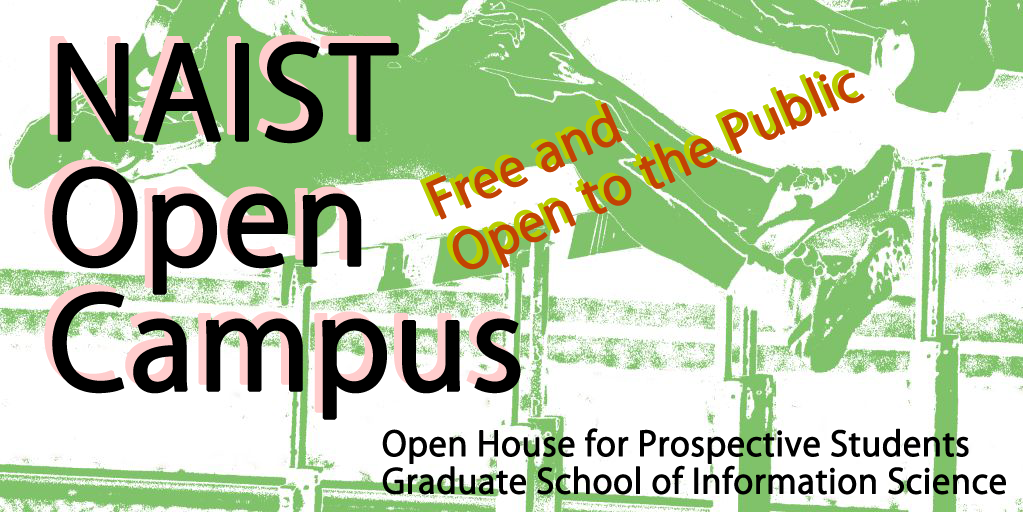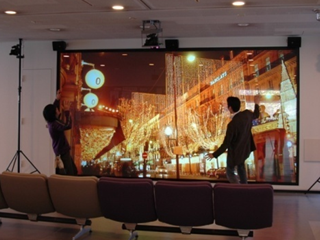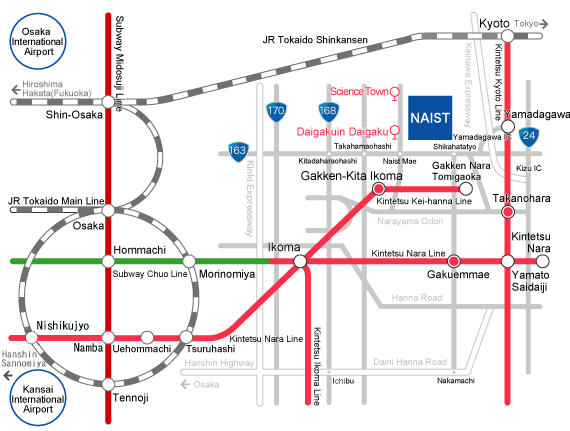|
Computer Science
|
|
We offer education and researches on computer hardware and information network to establish fundamental technologies for the next generation computer science, including dependable and green IT.
|
Computing Architecture Lab.
(Nakashima Lab.)

|
High-Speed, Low-Power, Variable-Reliability, New-Material Computers
|
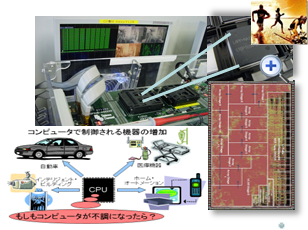
|
This laboratory focuses on the next generation computer system specially targeting at ultra low-power accelerators and dependable new material computers. New projects funded by JSPS(kibanA), JSPS(houga) have been started this year. Any student who has strong enthusiasm on computer engineering including both of hardware and software is welcome.
|
★ Low-Power Accelerator
★ Heterogeneous SMT OROCHI
★ Reliable Accelerator ERELA |
・ Multi-mode Accelerator EMAX
・ Film-Computer EMIN
・ Tiny-Accelerator MASCOT |
|
|
Dependable System Lab.
(Inoue Lab.)

|
Reliable VLSI Design, VLSI Testing, Distributed Algorithms, Parallel Algorithms
|
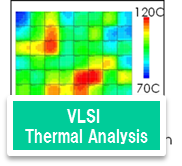
|
The laboratory is pursuing research on safe and secure systems including distributed systems with hundreds of computers and VLSIs with billions of transistors. Dependability is the concept from user's point of view that we can use systems reliably and securely. The servers with 12 Intel six-core processors or 6 SPARC quad core processors support our research.
|
★ VLSI Design-for-Testability & Test Generation
Demonstrations using CAD Tools
★ Shared Memory Distributed Algorithms
・Reliable and Dependable VLSI Design |
・Aging-aware Reliable VLSI Design
・Thermal-aware VLSI Testing
・High Quality VLSI Delay Test
・Parallel Algorithms |
|
|
Applied Algorithmics Lab.
(Seki Lab.)

|
security, software, database, coding, bioinformatics
|
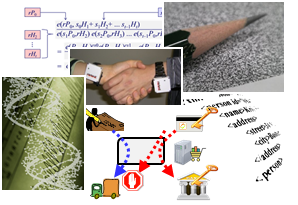
|
We develop mechanisms for computation and apply them to novel research problems, including security, software, database, coding, bioinformatics, .... Visit us at B507 and check our contribution in many different research areas.
|
★ Trans-organizational role-based access control
★ Anti-phishing user authentication for novice users
★ Extremely fast analysis of RNA structures |
・ Security in sensor networks
・ Verification of security against inference attacks
on XML data
・ Ultra high-density two-dimensional barcode scheme |
|
|
Ubiquitous Computing Systems Lab.
(Yasumoto Lab.)

|
Context Recognition & Sensing, Ubiquitous Navigation, Mobile Networking, Ubiquitous Systems Simulation
|
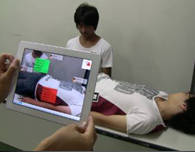
|
Ubiquitous computing systems provide users with more useful services at lower cost than ever before by processing, aggregating, and analyzing real world data sensed with various sensors and by recognizing the physical situations of the real space.
|
★ Support System for Emergency Rescue Operations
★ Control and Monitor System for Appliances through SNS
★ Tool for Optimal Indoor Wireless Sensors Deployment
★ Collaborative Development Environment for Ubiquitous
Applications via Virtual Space |
・ Indoor Localization using Light-intensity
・ Energy-saving Activity Navigation System
・ Estimation of users comfort levels
using smartphones |
|
|
Foundations of Software Lab.
(Ito Lab.)

|
ITS, Cloud, Mobile, Sensor Network
|
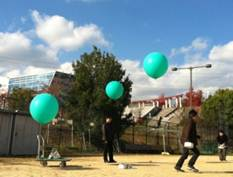
|
Division for foundations of software led by Professor Minoru Ito is engaged in research areas of intelligent transportation systems (ITS), cloud computing, and mobile computing, in order to realize efficient algorithms truly useful in the real world.
|
★ Intelligent Transportation System (ITS)
★ Cloud and Grid Computing, Peer to Peer |
★ Mobile Computing
★ Wireless Sensor Network |
|
|
Software Engineering Lab.
(Ken-ichi Matsumoto Lab.)

|
Empirical Software Engineering, Open Source Software Engineering, Software Security
|
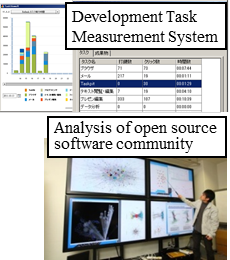
|
The software engineering lab. uses both theoretical and empirical approach to address various problems related to software development methodologies, human computer interaction and software lifecycle management. We fully exploits the potential of students' curiosity and creative thinking together with conventional research theories and techniques to tackle new topics in software engineering.
|
・ Software Repository Mining
・ Measuring Developers’ Activities
★ Analysis of Open Source Software |
・ Software Obfuscation / Watermarking
・ Global Software Development
★ TaskPit: Software Development Task Measurement System |
|
|
Software Design & Analysis Lab.
(Iida Lab.)

|
Software design, Source code analysis, Repository mining
|
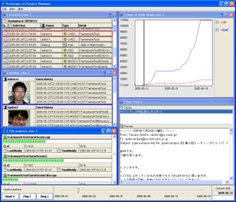
|
We study techniques for supporting the development and the design of large-scale systems. Especially, we focus on modeling theory and implementation technique for design process and document. Also, we are doing collaborative research with industry to develop practical approaches for software design.
|
★ Project Replayer
System for replaying development process
・ System for making development plan
・ Process complexity metric |
・ Analysis of bug fix processes
・ Analysis of the relationship between bug and refactoring
・ Feature extraction using source code analysis
・ Context mining from e-mail archives for development |
|
|
Internet Engineering Lab.
(Yamaguchi Lab.)

|
cloud computing, testbed, security, mobile computing, etc.
|
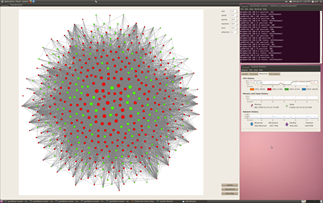
|
To enable continuous development for the Internet, we study the foundation and systematization of the Internet meta system. The meta system supports scalability, plasticity, security and mobility in the Internet. To contribute to society, we engage in constructing next generation networks through our research.
|
★ SOS Message Propagation via Smartphones
★ Miniature Internet
・ Mobile Data Offloading |
・ DoS Attacks Detection on ISM system
・ Anomaly Detection using Spectral Analysis
・ Weather Nowcasting via Smartphones
・ Quantifying Security in Multi-tenant Cloud Computing etc. |
|
|
Internet Architecture and Systems Lab.
(Fujikawa Lab.)

|
Internet, Mobile, Ubiquitous, Security
|

|
Inet-lab’s objective is to establish systems and applications on cross-sectional issues ( Especially, Mobile, Ubiquitous, Operation and Security) for Internet-wide. At this open campus, we demonstrate “IPv6 mobile resource discovery for Intelligent Transport System.
|
★ VANET services on IPv6
・ Cloud computing
・ 4K super high definition transmission |
・ Publish/Subscirbe system on Sensor network
・ Analyzing characteristics for Malware
・ Security expert educational program(IT Keys) |
|
|
|
Media Informatics
|
|
We offer education and researches on human-machine interaction and media to establish fundamental technologies to support people in advanced information society.
|
Computational Linguistics Lab.
(Yuji Matsumoto Lab.)

|
natural language processing, text mining, keywords, web text analysis, knowledge infrastructure
|
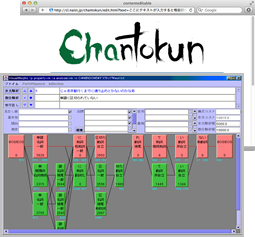
|
We focus on computational approaches to understanding natural language, the essence of human intelligence. We make both fundamental and applied research on natural language analysis.
|
★ Japanese Morphological Analyzer "ChaSen"
★ Corpus Management and Search Tool "ChaKi"
★ Japanese Dependency Parser "CaboCha"
★ Predicate Argument Structure Analyzer "YuCha" |
★ Opinion Mining from the Web
★ Error Correction System "Chantokun", "CorrCha"
★ Technical Term Retrieval Assistance |
|
|
Speech and Acoustics Processing Lab.
(Shikano Lab.)

|
Speech recognition, Speech dialog, BSS, Sound field reproduction Music signal processing
|
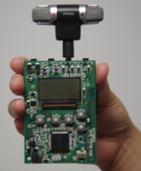
|
Our research activities spreads on various fields relating human speech: speech recognition, speech synthesis, sound field reproduction and speech communication. We mainly focus on man-machine communication via speech-oriented multi-modal interaction, and sound environment control for virtual sound reproduction.
|
★ Spoken Dialog System "Takemaru-kun"
★ Audio Object Controller
-Remix Your Favorite Music-
★ Spoken Dialog Robot "Kita-robo" (Gakken-Kita-Ikoma station) |
★ Blind Source Separation
-Extraction of Desired Sound-
★ Sound Virtual Reality |
|
|
Augmented Human Communication Lab.
(Nakamura Lab.)

|
Augmented Human Communication (AHC)
|
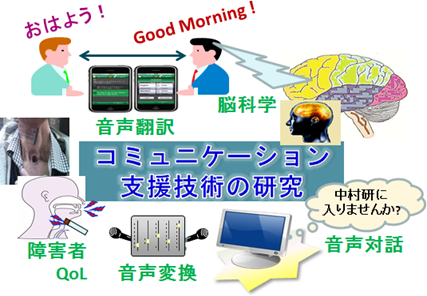
|
Toward enhancement of human communication abilities, AHC lab. is studying multilingual speech translation, dialog system, communication QoL, silent speech interface, user-adaptive speech recognition/synthesis, and brain analysis related human communication.
|
★ Speech translation
★ Speech Synthesis
★ Quality of Life |
★ Voice Conversion
★ Dialog System
★ Communication support for autism
★ Brain analysis related human communication |
|
|
Network Systems Lab.
(Okada Lab.)

|
sensing, ICT for medical and disaster relief, mobile communication and broadcasting
|
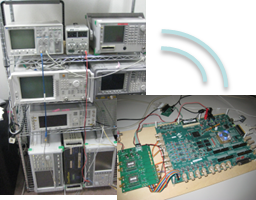
|
The laboratory develops wireless radio communication, broadcasting, and sensing system. And its embedding methods are also studying. Broadband and high reliable signal processing is applied to wireless sensing technologies for intruder detection and positioning inside the body.
|
★ Terrestrial-digital broadcasting reception
Software defined radio receiver
Turbo demodulation algorithm
・ RFID positioning inside the body |
・ Intruder detection utilizing LCX sensor
・ Radio Agents
・ Integrated optical and radio communications
・ Remote arc welder control in noisy link |
|
|
Vision and Media Computing Lab.
(Yokoya Lab.)

|
Coumputer Vision, Virtual Reality, Mixed Reality, Image Processing
|
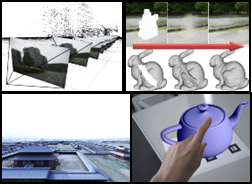
|
The laboratory develops technologies that extract 3D information from camera images and effectively show various information in a computer to human. Research fields are Computer Vision, Virtual Reality and Mixed Reality.
|
★ 3D Modeling from Video Images
★ AR using Mobile Computer
★ Image, Video, 3D Model Inpainting
★ Real-time marker hiding in AR |
★ Real-time CG Rendering based on Defocus and Blur Estimation
★ Augmented Telepresence using Aerial Omnidirectional Video
★ Position Estimation of Near Light Point using Clear Hollow Sphere
・ Camera Position and Posture Estimation using Landmark Database |
|
|
Interactive Media Design Lab.
(Kato Lab.)

|
Augmented Reality, Next generation interface, Information search
|

|
Our laboratory is studying about not only the future interactive media itself but also media technologies, human-computer interaction and data engineering which are needed to create innovative interactive media.
|
★ Transparent AR system
★ Interactive photo mosaicing
★ Effective XML search system |
★ Design support system using projector-camera system
★ Recommendation system using an extended skyline operator
・ Object tracking using natural features |
|
|
Ambient Intelligence Lab.
(Hagita Lab.)

|
Ambient Intelligence, Computer Vision, Human Robot Interaction
|
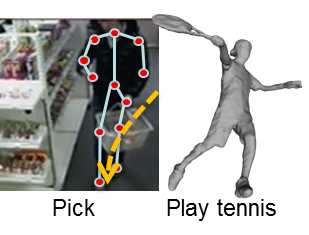
|
Our goal is realization of a safe, secure and comfortable life space for all members of society through the application of ambient intelligence. Ambient intelligence which means our life space has intelligence is developed by real world sensing, knowledge structuring and interaction for humans.
|
・ Human pose estimation with multiple pan-tilt cameras
・ Purchase estimation by analyzing actual customer's behavior |
・ Human motion analysis for rehabilitation
・ Self‐sacrifice robot for stress elimination |
|
|
|
Applied Informatics
|
|
We offer education and researches on computational systems, robotics, and bio-information processing to discover vital function and life phenomena.
|
Robotics Lab.
(Ogasawara Lab.)

|
Intelligent Robot System, Visual Interfaces, Human modeling
|

|
A robot is an intelligent system that obeys real world dynamics while interacts and communicates with human beings. Such a system requires sensing the real world environment in real-time (real-time sensing). In our laboratory, we develop real-time sensing technologies, such as robot vision and tactile sensing, and integrate them into an intelligent system.
|
★ Interruptible gesture planning for Android Robot
★ Handling for daily necessities by dual-arm robot |
・ Biological instrumentation and interfaces
・ Weight and softness sensation by Haptic device
・ Designing the robot behavior by reinforcement learning |
|
|
Intelligent System Control Lab.
(Sugimoto Lab.)

|
Systems Control, Mechatronics, Learning
|

|
Our research interest covers basic theories and applications for Systems Control, Sensing & Signal Processing and Machine Learning for Control.
|
★ Power Assist Technology for Bicycles
★ Modeling & Control of Artificial Muscle
★ Street Performance Robot via Visual Feedback |
★ Machine Learning for Robot Motor Skills
★ Feedback Error Learning for Control |
|
|
Mathematical Informatics Lab.
(Ikeda Lab.)

|
Mathematical Model, Machine Learning, Brain Informatics, Adaptive Systems
|
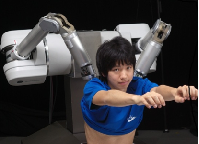
|
The laboratory studies Solutions with Mathematical Model, that include development and analysis of machine learning methods, applications to mechanism of brain information processing, and applications to engineering such as adaptive systems.
|
★ Mechanism of Decision Making by EEG
★ Robotics for Human Assistance and Care
★ Modeling of Driving Behavior
★ Control Application of 3D Measurement System |
★ Signal Processing of MEG
★ Gazing in Paint Observation
・ Analysis of Machine Learning Method
・ Machine Learning in System Biology |
|
|
Biomedical Imaging and Informatics Lab.
(Minato Lab.)

|
Biomedical Imaging, Medical Image Processing, Biomedical Engineering
|
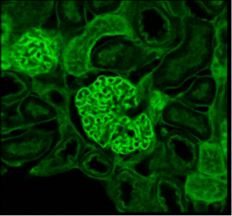
|
We study biomedical imaging and informatics technologies for exploring nano to macro phenomena in living organs. Our aim is to contribute to next generation medicine and biology. We developed a high speed volume rendering method for visualizing a high resolution microscopic 3D images from the two-photon microscopy techniques.
|
・ Two Photon Microscope
・ Coronary MRI
・ Diffusion Tensor MRI |
・ Cell Palpation Systems
★ High resolution volume visualization |
|
|
Computational Systems Biology Lab.
(Kanaya Lab.)

|
Medical Bioinformatics
|
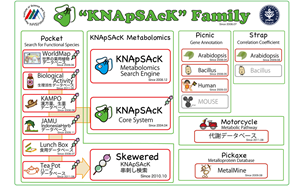
|
The purpose of our lab. Is to clarify molecular systems from bacteria to human. To attain this, we have developed medicinal/edible plant DB, metabolite-species, effects of metabolites and plants to human health. We also have developed network algorithm for visualizing interaction among biomolecules and dynamic simulation systems to clarify metabolite flows in organisms.
|
★ Multifaceted plant usage database
★ Visualization system of bio-networks
★ Dynamic simulation of metabolic flow |
|
|
|
Large-Scale Systems Science Lab.
(Kasahara Lab.)
|
System Analytics, Network Science, Service Science, Large-Scale Simulation
|
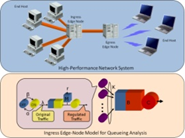
|
LSS Lab. research is aimed at developing mathematical modeling and simulation techniques for design, control and architecture of large-scale systems, with which the resulting systems achieve high performance and low vulnerability. Our research focus is on design framework, fundamental technologies and highly-qualified services, in particularly for large-scale computer/communication network systems.
|
★ Large-Scale System Modeling
★ Markov Analysis, Risk Analysis |
★ Theory for Information Systems
★ Network Science, Service Science
★ Large-Scale System Simulation |
|
|
Neural Computation Lab.
(Doya Lab.)

|
computational neuroscience, reinforcement learning, evolutionary robotics
|
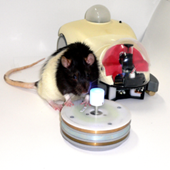
|
The goal of the laboratory is to establish computational models of the learning mechanism in animal brains, and then apply the principles to information processing of artificial creatures. To achieve this goal, we are building theoretical models of the molecular/neural networks involved in reward-based learning, and verifying these models through animal and robotics experiments.
|
★ Decoding human strategy in goal-oriented tasks
・ Multi-level simulation of basal ganglia circuit
・ Bayesian connectivity estimation from spike train data |
・ Recording animal brains in stochastic-reward tasks
・ Recording neuromodulators in delayed reward tasks
・ Quadruped/wheel robot experiments for learning
and evolution in realistic environment |
|
|
|
Collaborative Laboratories |
The Collaborative Laboratories provide opportunities for Master students to make a long-term visit to a private company or research institution and receive supervision for their Master thesis.
|
Symbiotic System Lab.
(NEC)
|
Inspiration computing, Co-creation communication
|
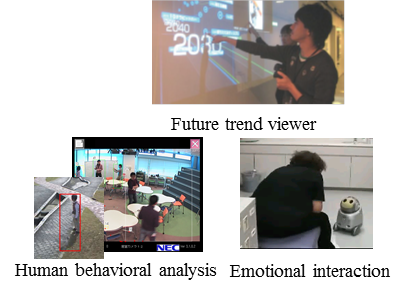
|
The laboratory studies a new type of information system which can create new values�by collaborating with people. This study is based on researches on human intention,�intellectual productivity, and supporting human intelligent activity. We imagine the future �where people will live with intelligent artifacts to realize their potential.
|
・ Multi-sensor behavioral analysis
・ Intellectual productivity modeling |
・ Co-creation promotion
・ Emotional adaptive interaction |
|
|
Technology of Radiological Science Lab.
(National Cerebral and Cardiovascular Center Research Institute)
|
PET, SPECT, MRI, Molecular functional imaging, Medical imaging processing
|

|
The laboratory is attached to National Cerebral and Cardiovascular Center (NCVC) and aimed at developing advanced medical imaging diagnostic devices and image processing technologies, which can provide functional images in clinical services. It is a unique group of experts from various fields and collaborate with medical doctors and companies.
|
・ Research for supporting clinical diagnostic imaging
Quantification and standardization of SPECT image
・Development of new generation imaging system
High resolution and high-sensitive SPECT device |
・ Medical Imaging Processing
Image reconstruction, Image analysis
Fusion, Motion correction
Computer simulation |
|
|
Programming Science Lab.
(AIST)
|
program semantics, programming logic, mathematical methods, verification, validation
|

|
PS Lab conducts scientific research on mathematical phenomena on programming. Its scope includes construction of mathematical model of programs (program semantics), rigorous specification of information processing systems, validation and verification.
|
★ Agda (dependently typed functional language, proof description language)
★ Assurance case (documentation of validation)
・ Open Systems Dependability |
・ Correctness by construction using constructive type theory
・ Control theory based on coalgebras
・ Mathematical methods of system construction (formal methods, semiformal methods) |
|
|
Network Orchestration Lab.
(NICT)
|
Large-Scale Network Infrastructure, New Generation Networks
|
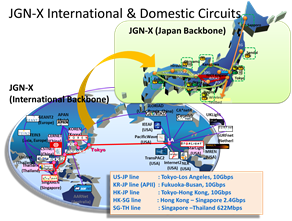
|
We are conducting research on the technologies that enable the evolution of the�Internet in collaboration with NICT. In particular, we are developing JGN-X, our�global network testbed, to stimulate R&D activities on novel network infrastructure�technologies, large-scale experiments, and international joint projects.
|
・ New Generation Network Technologies
Solve the problems with the Internet
・ Network Testbed Technologies (JGN-X)
Enable environment for large-scale experiments |
・ Software-Defined Network Technologies
Realize programmable networks
・ Virtual Network Technologies
Provide your personalized environment everywhere |
|
|
